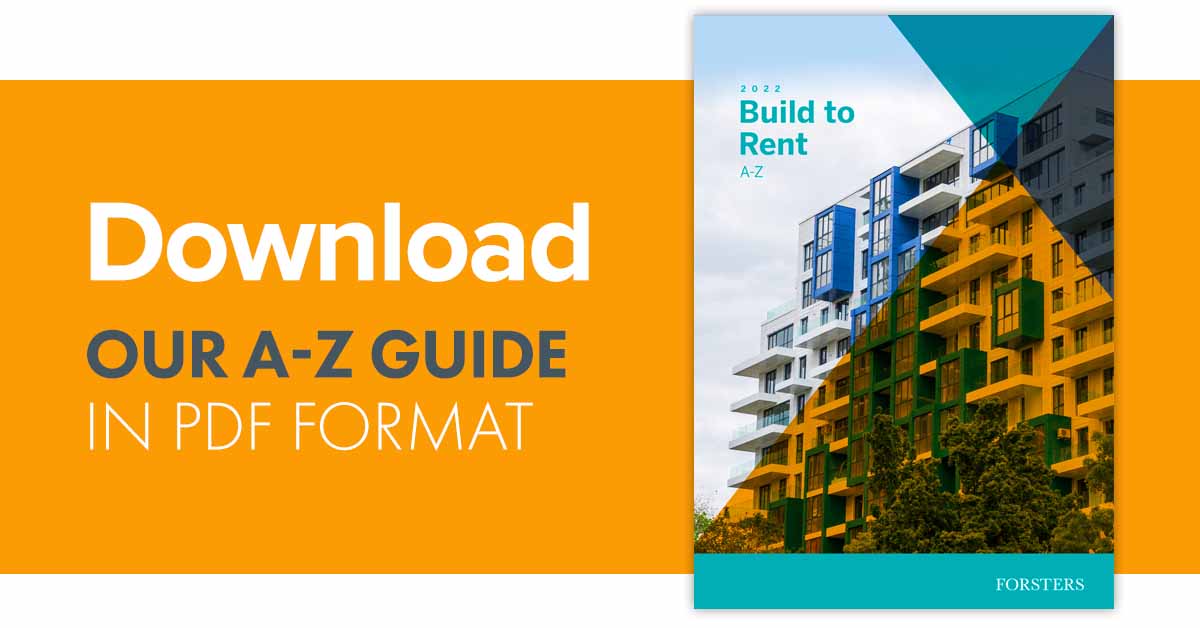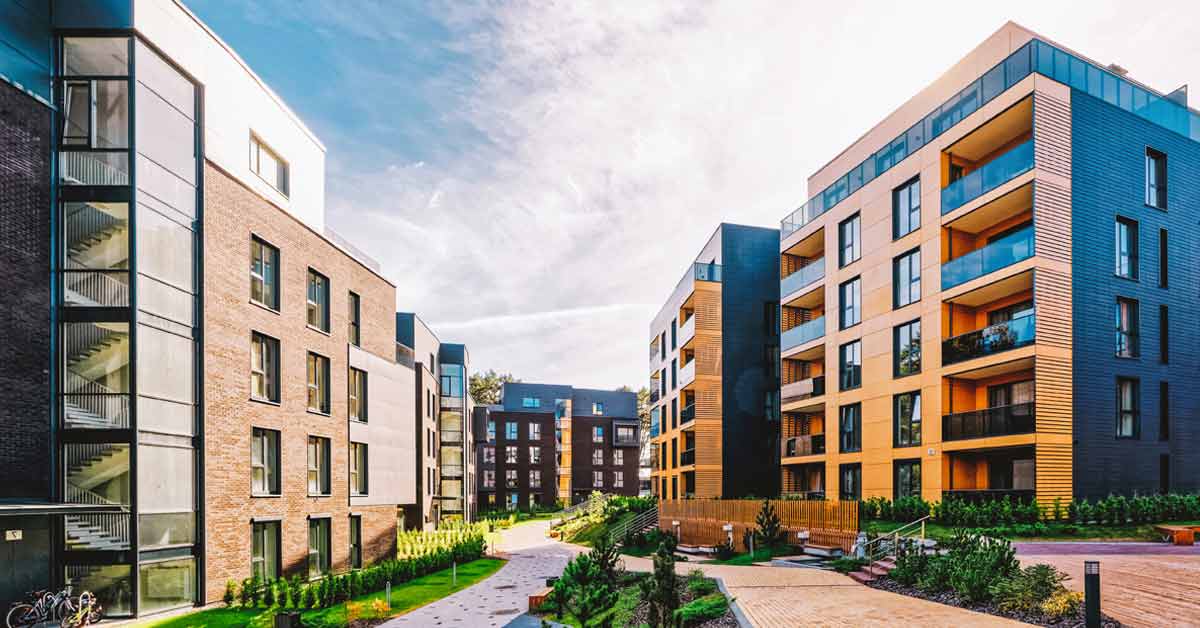BTR at a glance – A Build to Rent A-Z Guide

Download our Build to Rent A-Z Guide – helping you get to grips with the terminology and key concepts behind this rapidly evolving market.
Affordable Housing
Housing for sale or rent for households whose needs are not met by the market.
All Inclusive Rent
The rent payable under an AST which includes an element for service charges but generally excludes council tax and utilities which are payable by the occupier.
AST
An assured shorthold tenancy, the most common form of tenancy used in Multi Family BTR (including Affordable Housing).
BTR
Build to rent: a distinct asset class within the private rented sector, essentially new build developments designed specifically for renting. They tend to offer an enhanced range of services than, traditional rented accommodation for example, onsite managers, concierge services, communal spaces.
Clawback
A mechanism contained within a Section 106 Agreement to require developers to contribute more affordable units (or cash in lieu) following viability testing (when benchmarked against the testing at the time of a planning consent) once private units are sold/let.
Developer
A party with skill and expertise who plans and develops a BTR development, generally through the planning process to disposal.
Development Break Viability Review
A Viability Review undertaken in the event that construction of the development begins but then ceases entirely for a defined period, usually 12 months.
Early Stage Viability Review
A Viability Review to be undertaken if a certain point of construction (usually defined as “Substantial Implementation”) is not completed within a specified timeframe (anywhere from 12 to 24 months is common). The intention is to incentivise Developer’s to progress developments and avoid the pain of a Viability Review. The obligation usually requires additional onsite affordable housing or a financial contribution, or a combination of both, to be provided.
Forward Funder
A party who provides finance to the Developer to develop a BTR project, ranging from institutional funds through private equity.
Golden Brick
The level of construction a development needs to reach in order to qualify for VAT Zero Rating. This enables the developer sell a site (generally to an RP) at Golden Brick stage at zero rate VAT and allowing the developer to recover VAT it incurs on the development. The RP will then engage the developer to complete the development.
IRR
The internal rate of return of an investment over its life cycle, it is the annual rate of growth that an Investment is expected to generate and is calculated by setting NPV equal to zero when running a cashflow for each year of the Investment. Certain assumptions will be made, for example, GDV, in order to calculate the IRR. Investors back projects with positive NPVs and the IRR calculation allows Investors to choose between a number of projects with positive NPVs.
Late Stage Viability Review
A Viability Review undertaken towards the end of the development cycle, commonly between 75% and 90% occupation/sale of the development. As the development has been completed and is in the process of being occupied, it is not feasible to request further on-site provision so such review should only attract a financial contribution towards off site affordable delivery. A certain percentage (10-25%) of occupations are held back until the review is determined and the contribution paid.
Leakage
The difference between the All Inclusive Rent and the costs attributable to the provision of services at the BTR development including planned preventative maintenance.
Let Up Period
The time it takes the Forward Funder to let private units. This tends to be much quicker than the period for sales of private units.
Mixed Tenure
A mix of private, affordable, intermediate and social tenures with affordable tenures generally being at a discount of at least 20% of open market rent.
Multi Family BTR
BTR schemes focussed on city centre locations, providing around 200 + apartment units. Amenity heavy – think gyms, communal spaces, workspaces, with the aim of creating a community feel.
NPV
An Investment measure which tells an Investor whether the Investment will achieve a target yield. It is the value of all future cashflows, positive or negative, discounted back to present value at an assumed discount rate and with other assumptions built in e.g. assumed disposal value. A positive NPV means an asset over its life cycle is worth more than it cost. Investors back projects with positive NPVs.
Occupation Restrictions
Restrictions on occupation of (generally) a percentage of private residential units in a BTR development prior to Affordable Housing being available sold to an RP and ready for beneficial occupation.
PPM Strategy
A planned preventative maintenance strategy ensuring that maintenance tasks are scheduled ahead of time and take place regularly, enabling the reduction in reactive maintenance.
RP
Registered Provider: An approved body which owns and manages Affordable Housing and generally takes a freehold interest/long leasehold interest at Golden Brick and then funds the construction of the Affordable Housing.
Section 106 Agreement
An agreement entered into between the local planning authority, a Developer and a Forward Funder. This deals with the requirement to provide Affordable Housing within a BTR development and regulates the disposal of the Affordable Housing to an RP. It generally contains Occupation Restrictions and viability testing of Developer profit at key stages and providing for Clawback in certain situations.
Single Family BTR
Typically houses, and a smaller number of units in each development than in Multi Family BTR. Amenities are still important and focus on the demographic of the renters. Think more rural locations, community space and events.
Viability Review
An obligation in a Section 106 Agreement that reviews the viability of a development at particular stages to assess whether additional affordable housing can be provided, either by way of on site or via a financial contribution, in the event that additional profit, over and above that shown at the application stage, can be demonstrated. In London, the assessment is generally carried out against formulae issued by the GLA, with a variety of other approaches elsewhere.
Void Risk
The risk in the Forward Funder having empty units post practical completion which negatively impacts its IRR.
Zero Rating
A “VATable” supply where no VAT is charged to the buyer. This may apply (for example) to the construction of new dwellings or to the sale or grant of a long lease over newly constructed dwelling.
Build to Rent
At Forsters we have a large and dynamic real estate team, with a deep knowledge and understanding of the lifecycle of the Build to Rent (BTR) product. Engaging lawyers who understand the market as well as the most effective ways to structure deals and avoid pitfalls, will secure the value of your development and investment.









